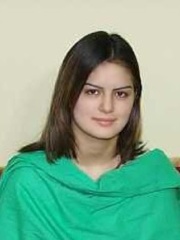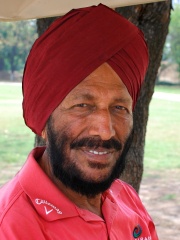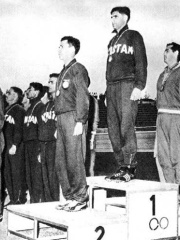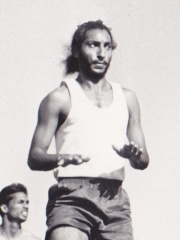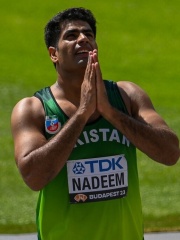Athlete
Najma Parveen
1990 - today
EN.WIKIPEDIA PAGE VIEWS (PV)

 Najma Parveen
Najma Parveen
Her biography is available in 8 different languages on Wikipedia (up from 7 in 2024). Najma Parveen is the 11,672nd most popular athlete (down from 10,492nd in 2024), the 259th most popular biography from Pakistan (down from 218th in 2019) and the 7th most popular Pakistani Athlete.
Memorability Metrics
Page views of Najma Parveen by language
Among Athletes
Among athletes, Najma Parveen ranks 11,672 out of 6,025. Before her are Lebogang Shange, Christina Bourmpou, Chala Beyo, Gediminas Truskauskas, Shura Kitata, and Vidar Johansson. After her are Mel Reid, Dilpreet Singh, João Azevedo, Nouha Landoulsi, Yoshua Shing, and Luiza Campos.
Most Popular Athletes in Wikipedia
Go to all RankingsLebogang Shange
1990 - Present
HPI: 18.20
Rank: 11,668
Christina Bourmpou
2000 - Present
HPI: 18.20
Rank: 11,669
Chala Beyo
HPI: 18.20
Rank: 11,670
Gediminas Truskauskas
1998 - Present
HPI: 18.20
Rank: 11,671
Shura Kitata
1996 - Present
HPI: 18.19
Rank: 11,672
Vidar Johansson
1996 - Present
HPI: 18.19
Rank: 11,673
Najma Parveen
1990 - Present
HPI: 18.19
Rank: 11,674
Mel Reid
1987 - Present
HPI: 18.17
Rank: 11,675
Dilpreet Singh
1999 - Present
HPI: 18.16
Rank: 11,676
João Azevedo
HPI: 18.16
Rank: 11,677
Nouha Landoulsi
1998 - Present
HPI: 18.16
Rank: 11,678
Yoshua Shing
1993 - Present
HPI: 18.15
Rank: 11,679
Luiza Campos
1990 - Present
HPI: 18.15
Rank: 11,680
Contemporaries
Among people born in 1990, Najma Parveen ranks 2,146. Before her are Patrícia Freitas, Abigail Irozuru, Stephen Jenness, Tanumafili Jungblut, Maria Grazia Alemanno, and Lebogang Shange. After her are Luiza Campos, Sevuloni Mocenacagi, Josep Romeu, Roilya Ranaivosoa, Kalione Nasoko, and Giulia Molinaro.
Others Born in 1990
Go to all RankingsPatrícia Freitas
ATHLETE
1990 - Present
HPI: 18.92
Rank: 2,140
Abigail Irozuru
ATHLETE
1990 - Present
HPI: 18.88
Rank: 2,141
Stephen Jenness
ATHLETE
1990 - Present
HPI: 18.65
Rank: 2,142
Tanumafili Jungblut
ATHLETE
1990 - Present
HPI: 18.41
Rank: 2,143
Maria Grazia Alemanno
ATHLETE
1990 - Present
HPI: 18.40
Rank: 2,144
Lebogang Shange
ATHLETE
1990 - Present
HPI: 18.20
Rank: 2,145
Najma Parveen
ATHLETE
1990 - Present
HPI: 18.19
Rank: 2,146
Luiza Campos
ATHLETE
1990 - Present
HPI: 18.15
Rank: 2,147
Sevuloni Mocenacagi
ATHLETE
1990 - Present
HPI: 18.13
Rank: 2,148
Josep Romeu
ATHLETE
1990 - Present
HPI: 18.00
Rank: 2,149
Roilya Ranaivosoa
ATHLETE
1990 - Present
HPI: 17.92
Rank: 2,150
Kalione Nasoko
ATHLETE
1990 - Present
HPI: 17.92
Rank: 2,151
Giulia Molinaro
ATHLETE
1990 - Present
HPI: 17.60
Rank: 2,152
In Pakistan
Among people born in Pakistan, Najma Parveen ranks 259 out of NaN. Before her are Nida Dar (1987), Umar Akmal (1990), Ahmed Shehzad (1991), Mahoor Shahzad (1996), Diana Baig (1995), and Bismah Maroof (1991). After her are Bisma Khan (2002), Muhammad Khalil Akhtar (1984), Talha Talib (1999), and Ghazala Javed (1988).
Others born in Pakistan
Go to all RankingsNida Dar
CRICKETER
1987 - Present
HPI: 23.25
Rank: 253
Umar Akmal
CRICKETER
1990 - Present
HPI: 23.12
Rank: 254
Ahmed Shehzad
CRICKETER
1991 - Present
HPI: 23.11
Rank: 255
Mahoor Shahzad
BADMINTON PLAYER
1996 - Present
HPI: 22.04
Rank: 256
Diana Baig
SOCCER PLAYER
1995 - Present
HPI: 21.73
Rank: 257
Bismah Maroof
CRICKETER
1991 - Present
HPI: 21.72
Rank: 258
Najma Parveen
ATHLETE
1990 - Present
HPI: 18.19
Rank: 259
Bisma Khan
SWIMMER
2002 - Present
HPI: 14.59
Rank: 260
Muhammad Khalil Akhtar
ATHLETE
1984 - Present
HPI: 14.05
Rank: 261
Talha Talib
ATHLETE
1999 - Present
HPI: 9.82
Rank: 262
Ghazala Javed
SINGER
1988 - 2012
HPI: 0.00
Rank: 263
Among Athletes In Pakistan
Among athletes born in Pakistan, Najma Parveen ranks 7. Before her are Milkha Singh (1935), Abdul Hamid (1927), Noor Alam (1929), Robbie Brightwell (1939), Prithipal Singh (1932), and Arshad Nadeem (1997). After her are Muhammad Khalil Akhtar (1984), and Talha Talib (1999).
Milkha Singh
1935 - 2021
HPI: 57.09
Rank: 1
Abdul Hamid
1927 - 2019
HPI: 51.47
Rank: 2
Noor Alam
1929 - 2003
HPI: 48.00
Rank: 3
Robbie Brightwell
1939 - 2022
HPI: 44.40
Rank: 4
Prithipal Singh
1932 - 1983
HPI: 43.46
Rank: 5
Arshad Nadeem
1997 - Present
HPI: 34.66
Rank: 6
Najma Parveen
1990 - Present
HPI: 18.19
Rank: 7
Muhammad Khalil Akhtar
1984 - Present
HPI: 14.05
Rank: 8
Talha Talib
1999 - Present
HPI: 9.82
Rank: 9































